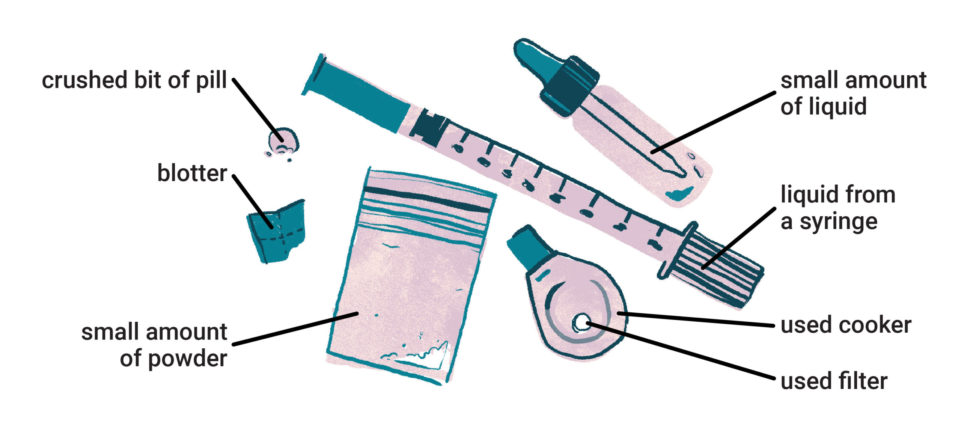People who use drugs in Toronto have long advocated for access to drug checking in an effort to reduce the harms associated with using drugs from the unregulated supply.
Launched in October 2019, Toronto’s Drug Checking Service offers people who use drugs timely and detailed information on the contents of their drugs, helping them to make more informed decisions.
This drug checking service also helps to uncover the makeup of Toronto’s unregulated drug supply, which includes illegal drugs, as well as legal drugs diverted from regulated markets for sale through criminal channels. Information on Toronto’s unregulated drug supply is made publicly available.
How do I get my drugs checked?
Toronto’s Drug Checking Service is free, anonymous, and available to everyone.
Accepted samples include drugs (10 mg of powder, crystals, rocks, or a crushed bit of a pill, a small piece of blotter, or a small amount of liquid) and drug equipment after it’s been used (a used cooker or filter, or leftover liquid from a syringe). There are some samples we do not accept, including organics – like cannabis, mushrooms, or anything THC-, CBD-, or nicotine-related – as well as hormones, steroids, vitamins, and performance enhancers (refer to our terms of service for more detail).

Samples are collected at five harm reduction agencies in Toronto where supervised consumption services are also offered, known as collection sites:
- Parkdale Queen West Community Health Centre (Queen West site) – Bathurst and Queen
- South Riverdale Community Health Centre – Carlaw and Queen
- The Works at Toronto Public Health – Yonge and Dundas
- Moss Park Consumption and Treatment Service – Sherbourne and Queen
- Parkdale Queen West Community Health Centre (Parkdale site) – Dufferin and Queen
Results are both qualitative and quantitative (i.e., which substances are found in each sample and varying degrees of information about how much of each substance is present) and are available within a business day or two. Results are communicated to service users by harm reduction staff in person, by phone, or by email, along with tailored harm reduction supports, guidance, and referrals to drug-related, health, and social services (e.g., supervised consumption, naloxone training, primary health care).
How does Toronto’s Drug Checking Service work?
Samples are transported from the harm reduction agencies where they are collected to a nearby laboratory at the Centre for Addiction and Mental Health or St. Michael’s Hospital, known as analysis sites, to be analyzed.
Toronto’s Drug Checking Service uses mass spectrometry technologies (gas and liquid chromatography). These sophisticated lab-based technologies offer detailed information about which substances are found in each sample, along with some information about how much of each drug is present.
This service operates by way of exemptions from the Government of Canada’s Controlled Drugs and Substances Act.
Who is involved in Toronto’s Drug Checking Service?
Members: Centre for Addiction and Mental Health | Moss Park Consumption and Treatment Service | Parkdale Queen West Community Health Centre | South Riverdale Community Health Centre | St. Michael’s Hospital, a site of Unity Health Toronto | Toronto Public Health | TRIP! Project
Partners and collaborators: Alliance for Collaborative Drug Checking | British Columbia Centre on Substance Use | Canadian Centre on Substance Use and Addiction | Centre on Drug Policy Evaluation | Four Counties Addictions Services Team | Fred Victor | Health Canada’s Drug Analysis Service | Health Canada’s Office of Controlled Substances | META:PHI | National Safer Supply Community of Practice | Office of the Chief Coroner for Ontario | Ontario Harm Reduction Network | Ontario Poison Centre | Ontario’s Centre of Forensic Sciences | Peterborough Public Health | Public Health Ontario | Regent Park Community Health Centre | Registered Nurses’ Association of Ontario | Seaton House | Street Health | Toronto Harm Reduction Alliance | Toronto Opioid Overdose Action Network | Toronto Paramedic Services | Vancouver Island Drug Checking Project
Funders: Health Canada’s Substance Use and Addictions Program | Ontario’s Ministry of Health | Public Health Agency of Canada | St. Michael’s Hospital Foundation
Toronto’s Drug Checking Service works closely with service users, and people who use drugs more broadly, to ensure the program meets the needs of the community it is intended to serve.
Acknowledgments
We acknowledge the members of our community that have lost their lives – both in the ongoing toxic drug supply crisis and long before – due to policies of drug criminalization.
We acknowledge that the land on which we operate is the traditional territory of many nations, including the Mississaugas of the Credit, the Anishnabeg, the Chippewa, the Haudenosaunee, and the Wendat peoples, and is now home to many diverse First Nations, Inuit, and Métis peoples.
We acknowledge that racialized communities and survivors of colonization are disproportionately impacted by unjust drug policies. We strive to support the development of equitable drug policies that are responsive to the needs of racialized people who use drugs – including Black, Indigenous, and People of Colour – and their communities.
We know that many of the samples we check are linked to both fatal and non-fatal overdose, as well as adverse health events. We acknowledge the people and pain behind the data we share.
Our work would not be possible if people who use drugs did not access our service and, as a result, advocate for themselves and help develop solutions that impact them. We thank the community of people who use drugs in Toronto who provide ongoing feedback on the design and implementation of our program, as well as our members, partners and collaborators, and funders for their ongoing commitment.